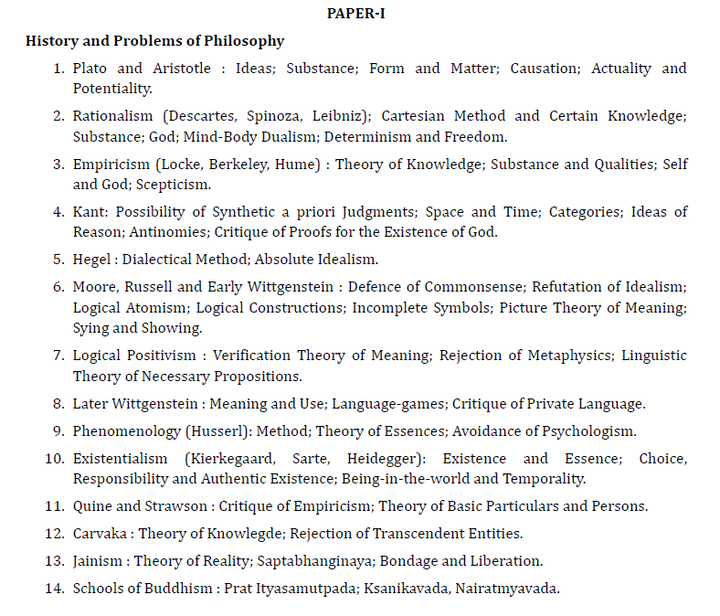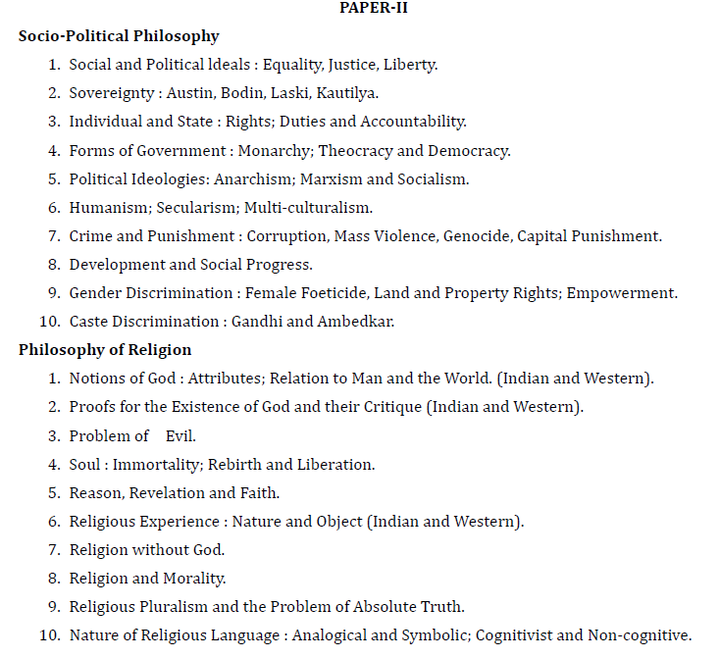Philosophy Optional for UPSC: Preparation Strategy, Highest Marks
By BYJU'S Exam Prep
Updated on: November 14th, 2023
Philosophy Optional has the shortest syllabus out of all other optional papers in the UPSC Syllabus. So, it makes for a good choice of optional paper for UPSC aspirants. The Philosophy Optional is open to candidates from any educational background. Many candidates see this subject as a great option for giving them a boost in the final marks.
Every year, around 800-1000 candidates take Philosophy Optional for their UPSC Mains exam. Being a subjective paper, this optional allows students to improve their chances of scoring high marks by simply getting a grasp of the fundamental concepts.
Table of content
-
1.
Philosophy Optional
-
2.
UPSC Philosophy Optional Syllabus
-
3.
Philosophy Optional Booklist for UPSC Mains
-
4.
UPSC Philosophy Optional: Preparation Strategy
-
5.
Philosophy Optional Pros and Cons
-
6.
How to Write Answers in Philosophy Optional?
-
7.
Highest Marks in Philosophy Optional
-
8.
Success Rate of Philosophy Optional
Philosophy Optional
Philosophy Optional is one of the 48 Optional Subjects offered by the commission for the UPSC Mains examination. It is considered one of the easiest subjects to score in and is a popular choice among aspiring candidates. With the right UPSC Preparation Strategy, candidates can score high marks in the Philosophy Optional.
Some of the previous year’s UPSC Toppers took Philosophy Optional for their Mains paper. Although this paper is assumed to be easy to score in, it requires a lot of dedicated studies and preparation strategies to score good marks.
| Paper Name | Philosophy |
| Type | Optional Paper for UPSC Mains |
| Parts | Paper 1 and Paper 2 |
| Success Rate | 7% |
UPSC Philosophy Optional Syllabus
Candidates appearing for the UPSC Exam with Philosophy Optional need to be thorough with the entire syllabus. The Philosophy Optional paper consists of two papers, Paper 1 and Paper 2. Here, we have shared the syllabus details for both papers.
Philosophy Optional: Syllabus for Paper 1
Paper 1 of the Philosophy Optional for UPSC deals majorly with the thinkers, their history and problems related to philosophy. It also deals with Indian Philosophy.


Philosophy Optional: Syllabus for Paper 2
Paper 2 is further divided into two parts, Socio-Political Philosophy and Philosophy of Religion.

Philosophy Optional Booklist for UPSC Mains
Here is the UPSC Philosophy Optional Booklist as shared by the previous year’s toppers to complete the Philosophy Optional Syllabus:
- Social and Political Philosophy by OP Gauba
- A Critical Survey of Indian Philosophy by CD Sharma
- Philosophy of Religion by John Hick
- An Introduction to Indian Philosophy by Datta and Chatterjee
- A Critical History of Western Philosophy by Y Masih
- A History of Philosophy by Frank Thilly
- Introduction to Religious Philosophy by Y Masih
- Introduction to Western Philosophy by Donald Palmer
UPSC Philosophy Optional: Preparation Strategy
Many people choose philosophy as an optional subject in UPSC, thinking that the subject is easy to score in. However, one should be wary of taking it easy and not engaging in proper planning and study. In fact, to score good marks in the UPSC Philosophy Optional, candidates need to follow a well-made strategy.
Here, we have shared how you can create your own study strategy for the exam –
- Go through the entire UPSC Philosophy Syllabus.
- Highlight the important topics by referring to the previous year’s question papers.
- Cover the topics with the highest weightage first.
- Prepare notes for all important topics.
- Revise the notes every day.
Also Read,
Philosophy Optional Pros and Cons
Candidates choose UPSC Philosophy Optional because the subject has several advantages. For starters, it has the shortest syllabus out of all 48 optional subjects offered in the UPSC examination. As long as you are someone who is genuinely interested in the subject or have studied it during your graduation, you will not have any trouble scoring good marks in it.
That being said, the subject has its own challenges. For example, if you are not good at Philosophy Optional fundamentals, you might not stand a chance at scoring good marks in it. Here, we have enlisted some of the Philosophy Optional Pros and Cons to help you analyze whether or not it is the right option for you.
Philosophy Optional Pros
- Out of the 48 optional subjects offered for the IAS exam, Philosophy Optional has the shortest syllabus. That means you will be able to cover the UPSC Syllabus earlier and gain an edge over your competition.
- The syllabus for the UPSC Philosophy Optional can easily be covered in 2 months with a good preparation strategy.
- Philosophy topics can also help you prepare for the Ethics, and Essay paper as the subject will be covering humanism, democracy, secularism, religion, morality, and women empowerment topics.
- Philosophy Optional will help the candidate develop critical insight, which will help them write their answers with original thought. It can also help them develop their own ideas.
- Candidates choosing this subject do not require prior knowledge about it. The subject consists of general subjects and ideas, which are explored deeply, of course.
Philosophy Optional Cons
- People who struggle with theoretical subjects may find it difficult to attempt the UPSC Philosophy Optional.
- Since it is a theoretical subject and requires subjective answers, candidates with weak fundamental knowledge about the subject may find it hard to attempt.
- UPSC asks indirect questions in Philosophy Optional. At times, it becomes difficult for the candidate to identify the topic from which the question is asked, leading them to answer incorrectly.
- Candidates require subjective and critical thinking to answer Philosophy Optional questions.
- Candidates also require excellent writing skills to write well-structured answers to score well in this exam.
How to Write Answers in Philosophy Optional?
Being one of the simplest UPSC optional subjects, philosophy may be prepared quickly with the right approach.
- Introduce the doctrine that is the focus of the question first. Briefly explain what it implies.
- You should then go into great depth about each aspect of the concept asked.
- The relationship between this specific theory or doctrine and other theories should then be discussed.
- Write a reasonable critique of the theory in the subsequent points/paragraphs.
- The theory can then be contrasted with those of other philosophers and theories.
- You should discuss the theory’s importance or practicality as your final point.
Highest Marks in Philosophy Optional
UPSC Philosophy Optional is a popular choice among aspiring IAS candidates for their main examination. Often, candidates who end up being toppers take up this optional. Philosophy Optional is a good choice because it is easy to cover this subject and score good marks in it. In the history of UPSC exams, Aamir Ul Shafi Khan scored 2nd rank in UPSC CSE 2015 examination with Philosophy Optional.
Here is a list of the highest marks obtained by candidates with UPSC Philosophy Optional:
| Year | Name | Rank |
| 2017 | Juhi Jalota | 122 |
| 2017 | Garima Agrawal | 241 |
| 2017 | Hemant K. Singh | 359 |
| 2016 | M U Sri Rama Vinay | 410 |
| 2015 | Athar Aamir Ul Shafi Khan | 2 |
| 2015 | Jatin Lal | 42 |
| 2015 | Kumar Harsh | 43 |
| 2015 | Sudhanshu Dhama | 115 |
| 2015 | Sameer Shaikh | 135 |
| 2015 | Ambarish V L Vemuri | 150 |
| 2014 | Sanskriti Jain | 11 |
| 2014 | Mihir Patel | 27 |
| 2011 | Amrutesh Aurangabadkar | 10 |
Success Rate of Philosophy Optional
As compared to many other optional subjects in the UPSC exam, Philosophy Optional has a good success rate. We can determine the success rate of a subject by calculating the number of candidates who appeared for the exam with the number of candidates who passed the exam.
Here are the details of the success rate of UPSC Philosophy Optional:
| Year | No. of Appearing Candidates | No. of Passing Candidates | Success rate (%) |
| 2010 | 1866 | 80 | 4.3 |
| 2011 | 900 | 74 | 8.2 |
| 2012 | 1116 | 99 | 8.9 |
| 2013 | 736 | 58 | 7.9 |
| 2014 | 908 | 64 | 7 |
| 2015 | 847 | 47 | 5.5 |
